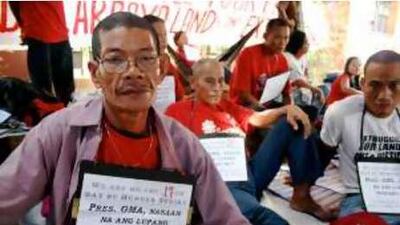MANILA// For generations, Jose Angeles's family has struggled for survival, working on a sugarcane plantation owned by a wealthy family. Two decades ago, the government pledged to break this cycle of exploitation by redistributing land. But the promise proved empty to many, and with the land reform programme set to expire on Dec 31, Mr Angeles took a desperate journey - he travelled to the capital and joined in a hunger strike.
"My grandfather, my father and I are labourers of the hacienda. I said to myself that this is the time I will be free of being a common slave," said Mr Angeles in an interview outside the House of Representatives. He and eight other farmers were on day 17 of their hunger strike. Seven Catholic bishops had joined them three days before, and they were supported by chanting, placard-carrying protesters determined to shame politicians into extending the programme.
They succeeded in gaining only a minor concession. Congress voted to extend the land reform programme for just six months, and the resolution removed a measure requiring some landowners to sell a portion of their property to the government. Instead, the government will rely on landowners who volunteer to participate. "It buries the programme," said Edcel Lagman, a lawmaker who authored a bill that would have extended it for five years and included compulsory land acquisition and distribution.
"It is completely diluting, if not killing, the heart and soul of the programme. I might as well have the programme lapse," he told Reuters news agency. The farmers agreed, and they have vowed to continue their hunger strike. Mr Lagman said the new resolution is "devoted to the landlord". Indeed, many of the politicians who supported the watered-down resolution are wealthy landowners. Mr Angeles and the other hunger strikers work on a hacienda owned by members of Gloria Arroyo's husband's family, on the sugar-producing island of Negros, in the southern Philippines.
"It's a very difficult situation," said Heidi Fernandez, who advocates for land reform with Task Force Maplod, a non-governmental organisation. "We have a president who is landed, her husband comes from the landed class, our lawmakers - many of them own land. They are in power, so what could these farmers do against these big, powerful landowners?" It is a system that has its roots in colonisation. The Spanish ruled the country for 400 years, naming the colony after their king, Philip, and they set up a feudal network of haciendas to grow sugar, bananas and other crops for export to Europe.
In 1988, hoping to end a communist insurgency, the government enacted the Comprehensive Agrarian Reform Programme (CARP), which would allow the state to buy land and distribute it to poor farmers. The farmers would then pay the government back over the long term with very low interest. Millions of farmers benefited from the programme, but about 800,000 have yet to receive the portions of land they were promised. With funding for the programme about to expire, about 1.1 million hectares remain to be distributed.
"We have a lot of success stories. Many of the farmers have improved their lives," Ms Fernandez said. "But because of problems with implementation, the programme has not yet been completed." Those problems often consist of foot dragging by landowners. Even after titles have been given to farmers, landowners find ways to delay the transfer of land, she said. Disputes have also turned violent. In the province of Negros Occidental, hired gunmen have killed 14 outspoken farmers since 2001, Ms Fernandez said.
"They've been killed by goons as a result of the struggle for land," she said. She added that the decision by congressmen to water down the programme and extend it by just six months will do little to change the situation. "That's not what we've been looking for," she said. "We really wanted CARP extended for five years, if not 10 years, with funding and compulsory acquisition." The decision not to include compulsory acquisition in the extended programme greatly reduces the amount of land that can be distributed under CARP. Of the 1.1 million hectares remaining to be distributed, about 700,000 are covered by notices of compulsory acquisition.
Mr Angeles said he and other farmers will continue to fight for land promised to them under compulsory acquisition, even if they have to resort to "extra-judicial means". Gabriel Claudio, Mrs Arroyo's spokesman, told reporters the six-month extension would give congress time to come up with a law that will continue the land reform programme. jferrie@thenational.ae

